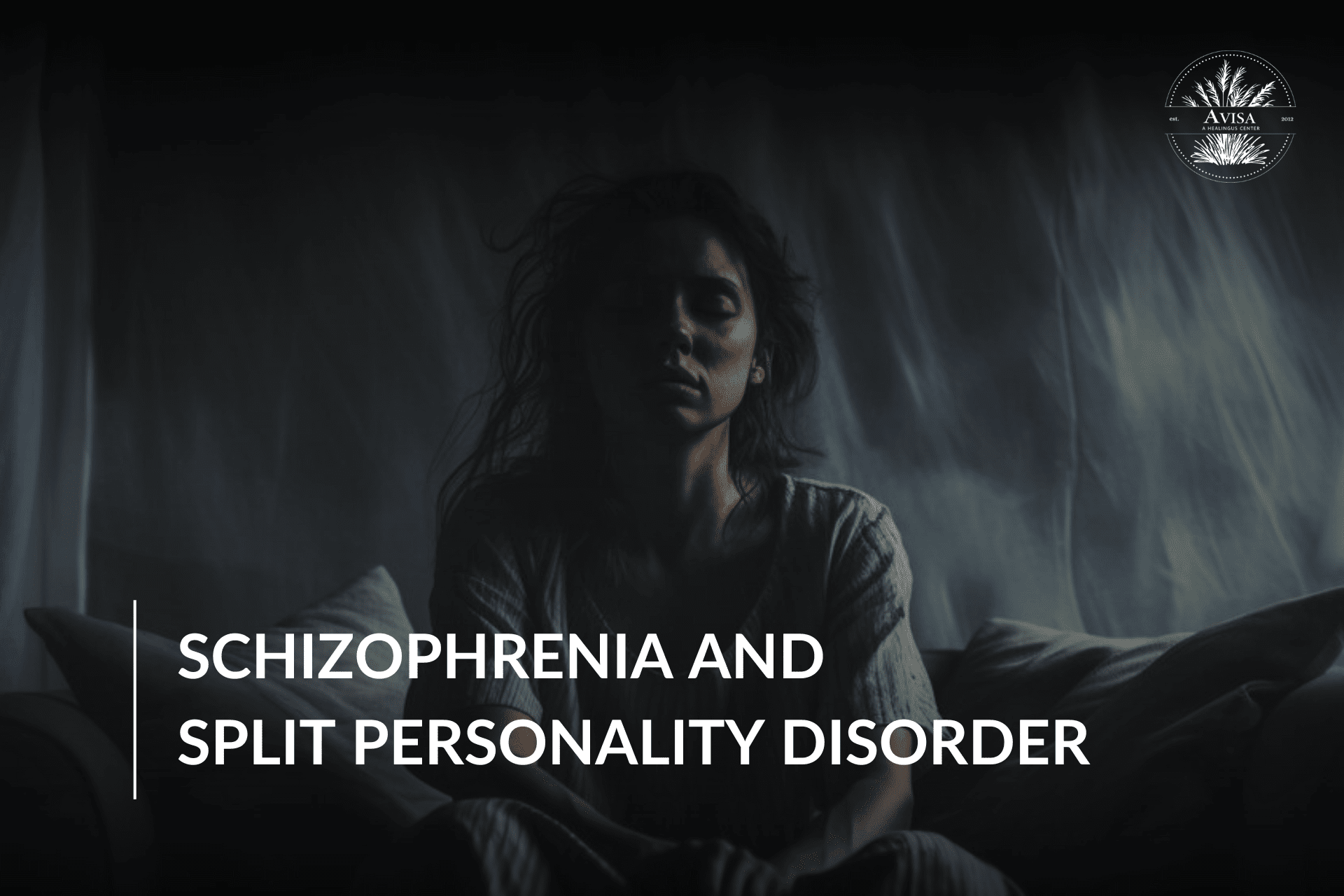Schizophrenia and split personality disorder (Dissociative Identity Disorder) both are serious mental health conditions. While the two conditions share some similarities, they are not the same and have distinct characteristics, symptoms, and treatments. Nearly 1% of people in the US live with schizophrenia or split personality disorder, yet many struggle to understand what they’re truly dealing with.
Schizophrenia is a serious mental illness that causes hallucinations (sensations that aren’t real) and delusions (beliefs that can’t possibly be true). It can also lead to jumbled thoughts, disorganized speech, and difficulties expressing emotions. Whereas people with split personality disorder, now known as Dissociative Identity Disorder (DID), experience a fragmented sense of self. They may have two or more distinct identities, each with its behavior, memories, and traits.
We are here to make things simple and clear for you. In this blog, we’ll help you understand what schizophrenia is, whether it’s a personality disorder, and why knowing the difference is so important for proper care and support.
Heal with Our Compassionate Support Now!
We offer personalized care with Cognitive-Behavioral Therapy (CBT), medications, and holistic treatments like acupuncture and omega-3 fatty acids to help you heal and thrive.
Schizophrenia And Split Personality Disorder: Insights
Schizophrenia and Split Personality Disorder may share a few similar characteristics, but they are entirely different conditions with unique causes and treatment approaches. Let’s understand them in detail.
What is Schizophrenia?
Schizophrenia is a psychotic disorder that affects how a person thinks, feels, and perceives reality. It can lead to changes in behavior and symptoms like hallucinations, where someone sees, hears, or feels things that aren’t there. People with schizophrenia may also experience delusions—believing things that are not true. This condition creates a disconnect from reality but doesn’t involve different personality states.
Schizophrenia symptoms include:
- Delusions
- Hallucinations
- Disorganized thinking or speech
- Disorganized or catatonic motor function
- Self-harm
- Depersonalization (feeling detached from oneself)
- Derealization (feeling detached from reality)
- Anosognosia (lack of awareness of the condition)
- Aggression
What is Split Personality Disorder?
Split personality disorder, now called Dissociative Identity Disorder (DID), is a dissociative condition where a person has multiple distinct identities. These identities function independently, each with unique memories, behaviors, and even voices or perceived appearances. Unlike schizophrenia, DID involves separate personality states, often forming as a way to cope with severe trauma. People with Dissociative Identity Disorder (DID) may experience unique symptoms, including:
- Uncontrollable thought streams
- Volatile emotional swings
- Radical changes in attitudes, beliefs, and preferences
- Seizures
- Dissociated travel (losing time or memory of activities)
- Paranormal-based personality states
- Substance misuse
- Flashbacks
- Suicide ideation
These symptoms highlight the complex and deeply personal nature of DID, which goes beyond common mental health challenges.
Schizophrenia And Split Personality Disorder: Key Difference
Schizophrenia and split personality disorder are often mistaken for one another, but they are quite different.
Schizophrenia is a psychotic disorder that distorts a person’s perception of reality. People with schizophrenia may also believe things that aren’t true, such as being watched or controlled by others. However, they typically experience one set of symptoms that affect their thoughts and reality.
DID, on the other hand, is a dissociative disorder. It involves disruptions in identity, memory, and consciousness. People with DID have multiple distinct personalities or identities, each with its own thoughts, behaviors, and memories.
The main difference is that schizophrenia is about losing touch with reality, while DID is about experiencing multiple identities within the same person. While both conditions can lead to changes in behavior and thinking, DID involves distinct personalities, whereas schizophrenia does not.
Both disorders can lead to significant changes in how someone interacts with the world, but understanding these differences is key to proper treatment and support.
How Is Schizophrenia Diagnosed
To diagnose schizophrenia, healthcare professionals use criteria from the DSM-5-TR, which includes:
- Symptoms present for at least 6 months: The person must show signs of schizophrenia for a significant period, with at least one month of active symptoms.
- Core symptoms: At least two of the following symptoms must be present for a significant portion of time in a month:
- Delusions
- Hallucinations
- Disorganized thinking
- Negative symptoms
- Disorganized or catatonic behavior
A thorough medical evaluation, including physical exams and psychological assessments, is required to rule out other possible causes of the symptoms, like drug use or medical conditions.
How Is Split Personality Disorder Diagnosed
Here’s how Dissociative Identity Disorder (DID), or Split Personality Disorder, is identified:
- Two or more distinct personality states: These identities can take control of the person at different times.
- Memory gaps: Frequent forgetfulness of everyday events, important details, or traumatic experiences.
- Significant distress: The symptoms cause major problems in daily life.
- Not linked to cultural or religious practices: The experiences are not part of accepted cultural beliefs or rituals.
- No substance or medical cause: The symptoms aren’t due to drugs, alcohol, or any other medical condition.
While both disorders involve a disconnection from reality, the causes and symptoms are very different, making it crucial to understand each condition for proper care and support.
Treatment Options For Schizophrenia And Split Personality Disorder
When diagnosing schizophrenia and split personality disorder, healthcare professionals look for symptoms that disrupt a person’s daily life for at least six months. However, the path to recovery and treatment is an essential part of managing schizophrenia.
In Avisa Recovery, a compassionate, comprehensive treatment approach is used to help individuals live fulfilling lives while managing their condition. Treatment often involves:
Therapy and Counseling
Cognitive-behavioral therapy (CBT) can help individuals understand and manage their thoughts and behaviors, reducing the intensity of delusions and hallucinations.
Medication
Antipsychotic medications are commonly prescribed to help balance brain chemistry, reducing symptoms like hallucinations and delusions. Alongside medication, some people find alternative therapies helpful, though they should always be discussed with a healthcare provider. These may include:
- Omega-3 fatty acids: Research suggests these can support brain health and may alleviate certain schizophrenia symptoms.
- Acupuncture and Yoga: These alternative treatments can be effective in managing stress and promoting relaxation, though they should complement, not replace, traditional treatments.
Support Systems
Building a strong support network of family, friends, and mental health professionals ensures that the person has the tools and encouragement needed to succeed in their daily life.
Skills Training
Programs aimed at improving social skills, self-care, and problem-solving can help people with schizophrenia feel more confident and independent in their daily activities.
At Avisa Recovery, we focus on treating the whole person, ensuring that every individual has the resources and support to manage their symptoms and lead a fulfilling life.
How Does Avisa Recovery Help?
Both schizophrenia and split personality disorders are highly misunderstood conditions. These are mental health conditions that often blur the line between reality and imagination. At Avisa Recovery, we specialize in personalized, effective treatment for these and other disorders. Our comprehensive approach includes Cognitive Behavioral Therapy (CBT), medication management, and other therapies, all tailored to your unique needs. Our dedicated team stays up-to-date with the latest evidence-based practices to ensure the best outcomes.
Avisa Recovery provides a supportive, holistic environment to help you achieve long-term recovery and lead a fulfilling life. Choose Avisa Recovery for compassionate, treatment-focused care.
Tired of fighting addiction and mental health struggles?
Ignoring both deepens the struggle. Our holistic approach—detox, therapy, and medication-assisted treatment—can help you heal. Take the first step today.
FAQs: Treatment At Avisa Recovery
Q: Can I fully recover from schizophrenia?
A: While full recovery is possible, it often takes time, treatment, and ongoing support to manage symptoms.
Q: How long does treatment for schizophrenia take?
A: Treatment timelines vary, but it can take months or years to stabilize and manage symptoms effectively.
Q: Can schizophrenia and Dissociative Identity Disorder be treated with the same treatment?
A: Yes, both conditions can be treated with similar approaches, including therapy, medication, and support to manage symptoms.
Q: How can I support someone with schizophrenia or Dissociative Identity Disorder?
A: Encourage treatment, be patient, and provide a safe, understanding environment for both conditions.










